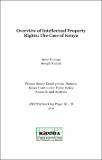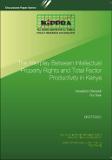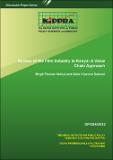| dc.description.abstract | Theory and experiences amongst the Asian Tigers reveal that knowledge
has an important role to play in promoting economic growth. Knowledge
however, is a non-rival good with partial excludable characteristics.
Intellectual Property Rights therefore encourage the development
and commercialization of creations of the mind - intellectual property
(IP). If such creations were made available to the public without any
legal IP protection, this becomes public knowledge, hence standing the
risk of being copied or imitated. This diminishes the potential profits
and discourages innovators from engaging in innovative activities.
This study aims at reviewing the intellectual property regulations
and structure, drawing on its role in promoting the generation of new
knowledge. The study does this by providing a global picture with
regard to the use, economic benefits and origin of intellectual property
rights, and by providing statistics on the different intellectual property
rights tools in Kenya, such as patents, industrial design, utility models,
trademarks, copyrights and plant breeder’s rights. The study also
provides an overview of the regulatory and institutional framework
governing intellectual property rights, including a review of the recent
developments, and the challenges faced in Kenya, including cases of
infringement and misappropriation of intellectual property rights. The
study’s recommendations encourage development of knowledge based
growth as envisioned in Vision 2030. | en |




